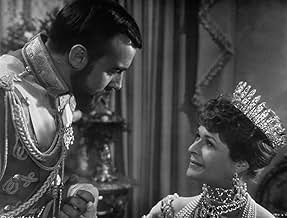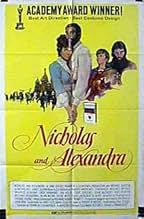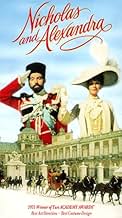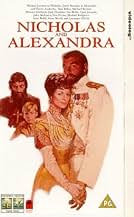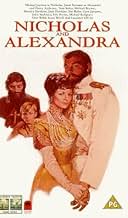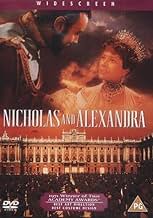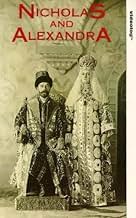Ajouter une intrigue dans votre langueTsar Nicholas II, the inept last monarch of Russia, insensitive to the needs of his people, is overthrown and exiled to Siberia with his family.Tsar Nicholas II, the inept last monarch of Russia, insensitive to the needs of his people, is overthrown and exiled to Siberia with his family.Tsar Nicholas II, the inept last monarch of Russia, insensitive to the needs of his people, is overthrown and exiled to Siberia with his family.
- Réalisation
- Scénario
- Casting principal
- Récompensé par 2 Oscars
- 3 victoires et 11 nominations au total
Avis à la une
This overlong film contains drama , emotion and notorious deeds dealing with the over-detailed depiction of happenings preceding Russian Revolution until the deaths of Czar and family . Gorgeous sets and spectacular production design by John Box and Gil Parrondo ; being mostly filmed in Spain , as the Royal Palace of Madrid . It's marvellously photographed by Freddie Young in magnificence color . Evocative and sensitive musical score by Richard Rodney Bennnett . The picture is well directed by Franklin J. Schaffner . He directed excellent motion pictures as "The Planet of the Apes", "Patton," "Papillon", ¨"Nicholas and Alexandra", after the flop of his film titled " Islands in the Stream ", in which went on to coincide with the actor of "Patton," George C. Scott, decided to embark on a project more commercial and successful as "The Boys From Brazil" , however ¨Sphinx¨ ,¨Lionheart¨, ¨Si Giorgio¨were others flops . Rating : Better than average , worthwhile watching
The picture based on facts , it begins when Japan's own territorial ambitions on the Chinese and Asian mainland. Russia is involved in a costly war with Japan over the Korean peninsula and the Czar rejects all recommendations that he bring the war to an end. War began in 1904 with a surprise Japanese attack on the Russian fleet in Port Arthur, without formal declaration of war and Russia is defeated by Japan . The Romanovs (Michael Jayston, Janet Suzman) are absolute rulers, among the last of their kind in Europe, living in luxury while the vast majority of Russians live in absolute poverty and take place revolts . As on January 1905 , Gapon (Julian Glover) began his march . Locking arms, the workers marched peacefully through the streets. Some carried religious icons and banners, as well as national flags and portraits of the Tsar. As they walked they sang religious hymns and the Imperial anthem, 'God Save The CZar'. All of the converging processions were scheduled to arrive at the Winter Palace . Throughout the city, the marchers found their way blocked by lines of infantry, backed by Cossacks and Hussars; and the soldiers opened fire on the crowd . The official number of victims was 92 dead and several hundred wounded. By the time of Stolypin (Eric Porter)'s assassination by Dmitry Bogrov, a student in a theatre in Kiev on 18 September 1911, Stolypin had grown weary of the burdens of office . Because of the fragility of the autocracy at this time, Nicholas and Alexandra chose not to divulge Alexei's condition to anyone outside the royal household. In fact, there were many in the Imperial household who were unaware of the exact nature of the Tsarevich's illness. At first Alexandra turned to Russian doctors and medics to treat Alexei; however, their treatments generally failed, and Alexandra increasingly turned to mystics and holy men . One of these was an illiterate Siberian , Grigori Rasputin (Tom Baker) , appeared to have some success. Rasputin's influence over Empress Alexandra, and consequently the Tsar, had grown stronger ever since 1912, when the Tsarevich nearly died from an injury while the family was on vacation at the hunting lodges at Bialowieza and Spala ,now part of Poland . The Czar's decision, against advice, to authorize a general mobilization in 1914 leads to disaster on the front . As the government failed to produce supplies, there was mounting hardship creating massive riots and rebellions. With Nicholas away at the front in 1915, authority appeared to collapse , while Empress Alexandra ran the government from Petrograd from 1915 , and the capital was left in the hands of strikers and mutineering conscript soldiers . At the end of the "February Revolution" of 1917 , Nicholas II chose to abdicate . He firstly abdicated in favour of Tsarevich Alexei, but swiftly changed his mind after advice from doctors that the heir-apparent would not live long apart from his parents who would be forced into exile .The abdication of Nicholas II and the subsequent Bolshevik revolution brought three centuries of the Romanov dynasty's rule to an end. The fall of autocratic Tsardom brought joy to Liberals and Socialists in Britain and France and made it possible for the United States of America, the first foreign government to recognise the Provisional government, to enter the war early in April fighting in an alliance of democracies against an alliance of empires. In Russia, the announcement of the Tsar's abdication was greeted with many emotions . However , revolutionaries abound and the rise of the Bolsheviks, led by Lenin (Michael Bryant) and Trotsky (Brian Cox) , slowly begin to gain an advantage . Before the year is out the Bolsheviks will be in power and the Romanovs in custody. In Siberia takes places the eventual execution of the entire family - the Czar, Czarina, four daughters and one son - in July 1918.
The script really is first rate, it doesn't matter that all the characters are far more English than Russian, what counts is the way a tragic situation unfolds in front of the viewers. For many the last czar probably was a monster as he ordered the death of hundreds of thousands. Yet watching the movie you want to believe that he is the victim of circumstances, far removed from everyday life and a husband and father who cares deeply and, in spite of all his outrageous decisions and non-decisions, wants to be good". Strange as it seems, but the intimate scenes between him and his wife are the highlights of the movie, as they really bring out the affection between two people who are attracted to each other although they are only too familiar with each other's flaws. It makes the tragic ending of the movie all the more sad.
I had the chance to visit Nicholas' palace in Yalta a few years back. It is full of family snapshots, as the czar was an avid photographer (and also movie maker). It is striking how modern those pictures are, how relaxed and middle class" the imperial family, always in bathing suits or some elegant leisure wear, appears. In a strange way the Russian emperor comes through as being much less crusty than his contemporaries on the throne of Britain, Germany or Austria-Hungary. It gives you the idea that he was a modern man. Strangely, whenever he himself is in the photos, he is never in the center of the picture but always somewhere in a marginal position, seeming to be either bemused or slightly embarrassed. What a sad career!
An interesting side-effect of the movie is the fact that it shows that at the outset of World War I the crowned heads of Europe, many of them related to each other and on relatively intimate terms, could have prevented the bloodshed. They failed colossally and thus sealed the fate of a continent that still tries to find unity and a common denominator.
Produced with lavish care and attention to detail by Sam Spiegel for Horizon Pictures, "Nicholas and Alexandra" is among the last of the great "thinking man's epics" and one of the best. This is due in no small measure to the wonderful screenplay by James Goldman. Goldman, who also scripted "The Lion in Winter" and "Robin and Marian" had a fine ear for dialogue, and "Nicholas and Alexandra" is a pleasure to listen to as well as to behold. Like Robert Bolt's "Lawrence of Arabia", Charles Wood's "Charge of the Light Brigade" and Robert Ardrey's "Khartoum", all fine historical epics, Goldman's "Nicholas and Alexandra" is elevated by an intelligent script laced with fine dialogue. Transposing history onto the screen is never an easy task, but the story of the last years of the Romanov Dynasty is well served by Goldman. He skillfully telescopes events, while still remaining basically true to historic fact. One way or another, all films dealing with history compromise fact for drama. The best of them achieve a balance between the two. Those pedants who quibble over this fact of life, please refer to the historical plays of Shakespeare for it's validation.
Among the film's many pleasures is the high level of acting by an impressive cast. Michael Jayston and Janet Suzman are simply magnificent in the lead roles. It was an uncanny and bold choice using two unknowns to star in a film of this scope, and they have no problems carrying the three hour film. Both create complex, three-dimensional characters, deeply flawed, yet appealing, sympathetic and infuriating. it is the film's unwillingness to portray them as simply victims that gives it tragic grandeur. A special note must be made of Tom Baker's performance as Rasputin. Too often in previous movies film-makers have exploited the sensational events of the man's life and nothing more. This film actually had the courage to downplay those lurid elements, striving instead for complexity of character. Here we have a tortured individual, a charlatan and a monk, lascivious yet craving spiritual redemption. The Imperial Children are also sensitively depicted, with a standout performance by Roderic Noble as the hemophiliac only son, Alexis. The internal angst he brings to the part in his later scenes is impressive. Franklin J. Schaffner's able direction keeps the film moving along, and at no time is there any danger of the film losing focus on the two leads. This was no mean feat considering the powerhouse supporting cast that included, Laurence Olivier, Michael Redgrave, Harry Andrews, Irene Worth, Jack Hawkins, Ian Holm, Michael Bryant, Brian Cox, Eric Porter, Timothy West, Peter McEnery, Julian Glover, Roy Dotrice, Maurice Denham, Alan Webb, Guy Rolfe, Steven Berkof and John Wood, all of whom do memorable turns.
In the first half of the movie, the filmmakers vividly bring to life the isolated fairy-tale world the Imperial Family inhabited. The beautiful palaces, and villas provide a striking contrast to the shabby, squalid prison quarters of the film's second half, which deals largely with the Romanov's exile and imprisonment in Siberia. The murder of the Royal Family in the basement of the Ipatiev house, the so called "House of Special Purpose" is one of the most strikingly directed scenes in the film. The brutal suddenness with which it is depicted packs quite a wallop. Filmed in Panavision, the film is gorgeous to look at. John Box's recreation of Imperial Russia at the turn of the century truly deserved it's Academy Award for Best Production Design, as did Yvonne Blake for Best Costume Design. Freddie Young's stunning cinematography and Richard Rodney Bennett's haunting music score were also nominated, though they both lost to other films. Finally it is a beautifully edited film, a marvelous example of invisible editing used to create a subtle, but powerful sense of irony. A superb film that deals intelligently with the problems inherent in transposing history onto film.
Le saviez-vous
- AnecdotesSir Laurence Olivier first suggested Tom Baker to be cast as Grigori Rasputin. Olivier was the director of the National Theatre in England; Baker was a member of the company.
- GaffesWhen the family is in the basement in the final scene, the Grand Duchesses' hairstyles are based on official photographs from 1914. In real life, when the Grand Duchesses were imprisoned, their heads were shaved due to illness. By the time they were killed in July 1918, their hair had grown to the napes of their necks.
- Citations
Tsar Nicholas II: Taking someone's life, no man should have that power.
Yurovsky: You had it.
Tsar Nicholas II: Yes. And I have learned that a strong man needs no power, and a weak man is destroyed by it. He's like a child. You don't shoot children, do you? In your new world, are there penalties for innocence?
Yurovsky: Sometimes. It takes a wise judge to know who is innocent and who is guilty. I wish I knew.
- Crédits fous"By courtesy of the National Theatre of G.B." is written underneath Tom Baker and Laurence Olivier's names in the end credits. "By courtesy of the Royal Shakespeare Company" is written underneath Janet Suzman's name.
- Versions alternativesThe present DVD issue is slightly longer than the original VHS versions and includes several scenes not featured in the earlier versions e.g. a Russian general committing suicide and more scenes of the royal family in captivity.
- Bandes originalesWiegenlied (Lullaby) Op. 49 No. 4
(uncredited)
Music by Johannes Brahms
Words from Des Knaben Wunderhorn
Sung by Alexandra
Meilleurs choix
- How long is Nicholas and Alexandra?Alimenté par Alexa
Détails
- Date de sortie
- Pays d’origine
- Site officiel
- Langues
- Aussi connu sous le nom de
- Nicholas and Alexandra
- Lieux de tournage
- Société de production
- Voir plus de crédits d'entreprise sur IMDbPro
Box-office
- Budget
- 9 000 000 $US (estimé)
- Durée3 heures 3 minutes
- Rapport de forme
- 2.35 : 1
Contribuer à cette page




